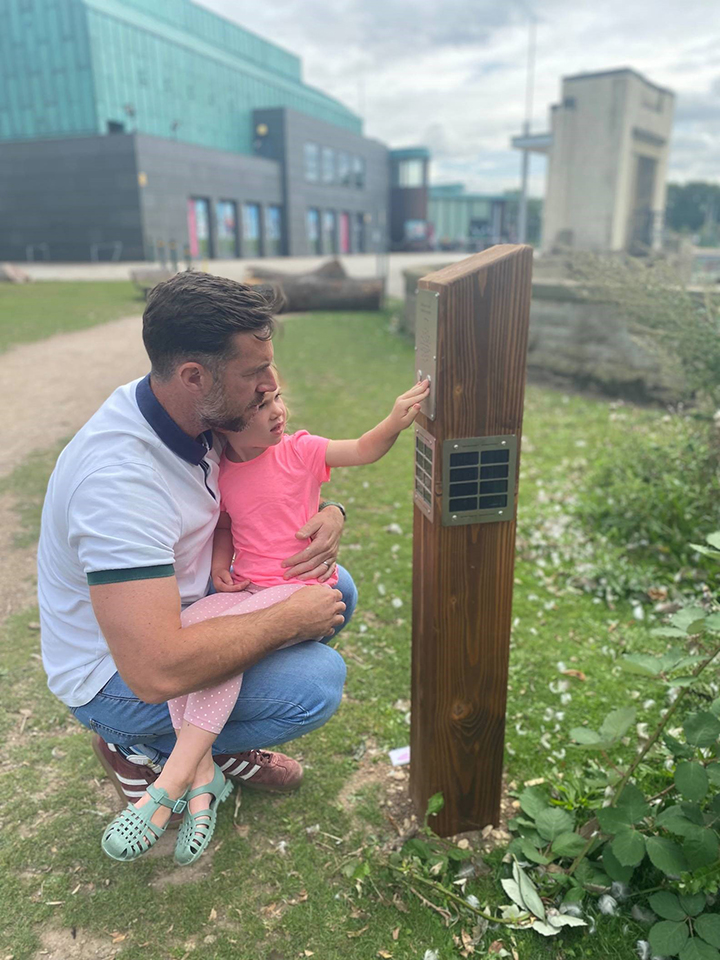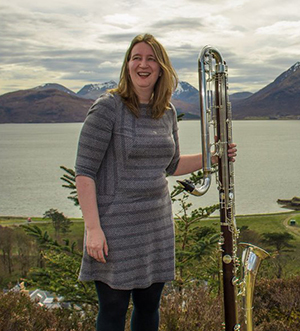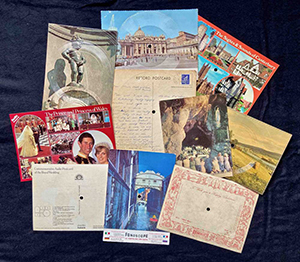Thursday, 20 January 2022
The bones of ancient bears, sound postcards and a giant clarinet are among the unusual characters in a new interactive experience for visitors to the shores of Highfields Boating Lake at the University of Nottingham.
Listen By the Lake features four new ‘listening posts’ that tell short stories about a selection of fascinating and unusual research projects currently going on at the university.
The idea is the brainchild of the university’s Institute for Policy and Engagement which has commissioned the short stories from selected researchers to make their work accessible to the public, especially families with children.
 Interactive Listening Post at Highfields Park
Interactive Listening Post at Highfields Park
The four posts are located on the banks of the boating lake just behind Lakeside Arts on University Park. At the press of a button, visitors can spend a few minutes hearing illustrated audio clips about the lives and work of university researchers on a range of topics currently under the spotlight in the Faculty of Arts.
Archeologist, Dr Hannah O’Regan, tells the story of how bears were an integral part of the entertainment scene in the time of Shakespeare and what DNA from an ancient brown bear skull can tell us about them. Fascinatingly, an old manuscript from the Sneinton area of Nottingham has revealed how bears were cruelly used for sport, in bear baiting with dogs – a popular activity in the city five centuries ago
Composer, Dr Elizabeth Kelly, shares her work on creating and sharing new music with audiences. Elizabeth tells how she teams up with other types of artists such as poets, choreographers, and film makers to create different kinds of performance experience. Visitors can hear one of her compositions for piano and a giant clarinet called a contra-bass – the largest and lowest-sounding member of the clarinet family which is as big as a person.
 © Sarah Watts, musician with her contra-bass.
© Sarah Watts, musician with her contra-bass.
In his research, culture expert, Dr James Mansell, investigates the use of sound to engage the public*. His listening post track shares his reinvention of the old-fashioned postcard for the digital age. Taking inspiration from an early 20th century postcard which had a small record embedded in it to play sounds on a record player, James has created the digital sound postcard and guides visitors through the creation and use of these with some examples to play and challenges to create their own sound postcard. James said:
“Sound-based public engagement works best when it involves taking listeners beyond their usual listening habits. Highfields Park is a public place. Anyone can visit. At the push of a button, listeners can hear about things they may never have come across in their lives or lines of work. Public parks have always offered respite from the sights and sounds beyond their boundaries. Along with the rustle of the wind, the lapping of the lake, and the tweets of local birdlife, park visitors can now hear snapshots of university life, too.”
 Early C20th Sound Postcards © Dr James Mansell
Early C20th Sound Postcards © Dr James Mansell
A fourth listening post features Dr Jai MacKenzie who presents her research into concepts of the ‘modern family’ which will be of interest to the many different types of family who visit Highfields Park and the university campus every day. Jai explores ideas of what constitutes a family nowadays from her research meetings with lots of different types of families all over the UK. She also discusses the effect of social media on how families interact with each other in the ‘always on, always available’ digital age.
Head of Public Programmes at the Institute, Maria Richards, said: “
During the pandemic many of us have spent more time appreciating parks and open spaces. We have installed the listening posts so that people who are enjoying Highfields Park and university grounds can connect with our researchers while walking round the lake. The idea is that families can learn a little about the incredible range of research that happens here without the need for pens, paper or a download. We plan to change tracks regularly to allow a diverse range of voices to be heard and an inspiring array of challenges to be set. We want families to make a stop at the listening posts a regular part of their visit, encourage people to explore our campus and nurture a sense of curiosity.
The content of the listening posts will change four times a year and feature research from different Faculties across the university. As well as audio tracks, each post features QR codes that visitors can scan to access more content, virtual exhibitions and information about each research project.
For more information about how the Institute is supporting families please visit www.nottingham.ac.uk/policy-and-engagement/themes/families/families-theme.aspx.
*Dr James Mansell has written a blog for the Institute on his work into the use of sound to engage the public.
Story credits
For more information, please contact Maria Richards, Institute for Policy and Engagement, University of Nottingham via email maria.richards@nottingham.ac.uk or Emma Rayner, Media Relations Manager on 07738 291242 or emma.rayner@nottingham.ac.uk
Notes to editors:
About the University of Nottingham
Ranked 97 in the world and 17th in the UK by the QS World University Rankings, the University of Nottingham is a founding member of Russell Group of research-intensive universities. Studying at the University of Nottingham is a life-changing experience, and we pride ourselves on unlocking the potential of our students. We have a pioneering spirit, expressed in the vision of our founder Sir Jesse Boot, which has seen us lead the way in establishing campuses in China and Malaysia - part of a globally connected network of education, research and industrial engagement.
Nottingham was crowned Sports University of the Year by The Times and Sunday Times Good University Guide 2024 – the third time it has been given the honour since 2018 – and by the Daily Mail University Guide 2024.
The university is among the best universities in the UK for the strength of our research, positioned seventh for research power in the UK according to REF 2021. The birthplace of discoveries such as MRI and ibuprofen, our innovations transform lives and tackle global problems such as sustainable food supplies, ending modern slavery, developing greener transport, and reducing reliance on fossil fuels.
The university is a major employer and industry partner - locally and globally - and our graduates are the third most targeted by the UK's top employers, according to The Graduate Market in 2024 report by High Fliers Research.
We lead the Universities for Nottingham initiative, in partnership with Nottingham Trent University, a pioneering collaboration between the city’s two world-class institutions to improve levels of prosperity, opportunity, sustainability, health and wellbeing for residents in the city and region we are proud to call home.
More news…